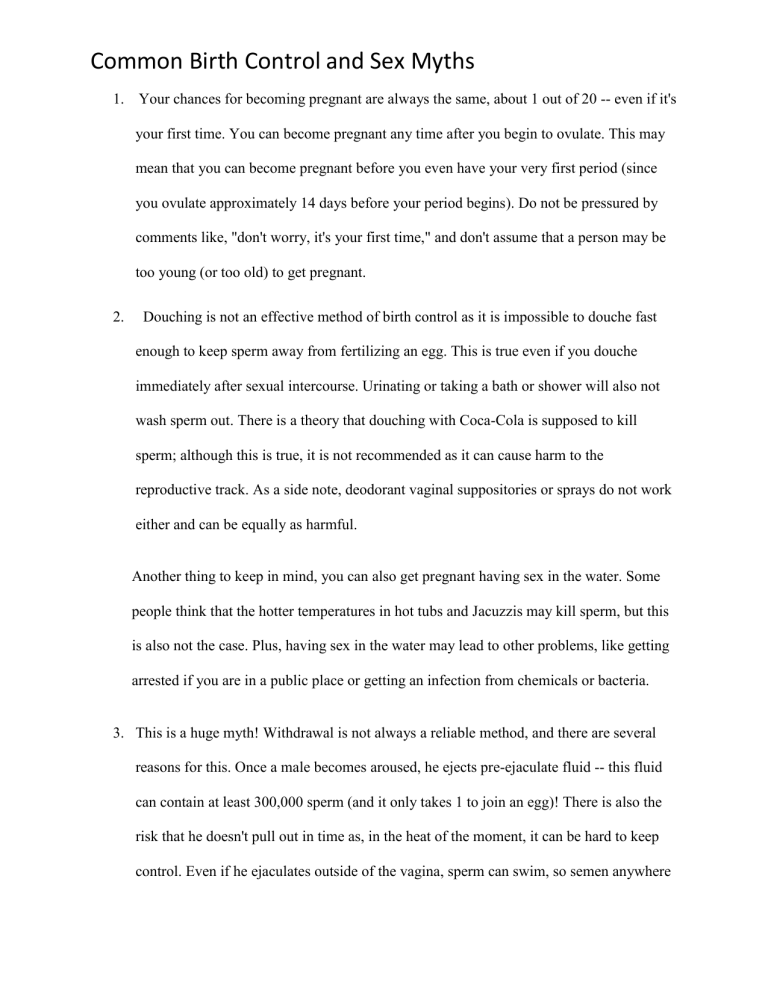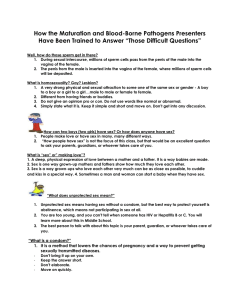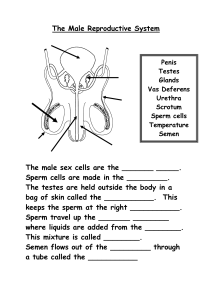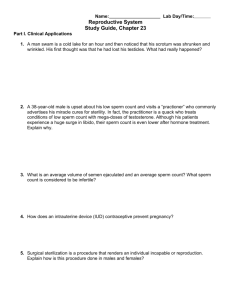
Common Birth Control and Sex Myths 1. Your chances for becoming pregnant are always the same, about 1 out of 20 -- even if it's your first time. You can become pregnant any time after you begin to ovulate. This may mean that you can become pregnant before you even have your very first period (since you ovulate approximately 14 days before your period begins). Do not be pressured by comments like, "don't worry, it's your first time," and don't assume that a person may be too young (or too old) to get pregnant. 2. Douching is not an effective method of birth control as it is impossible to douche fast enough to keep sperm away from fertilizing an egg. This is true even if you douche immediately after sexual intercourse. Urinating or taking a bath or shower will also not wash sperm out. There is a theory that douching with Coca-Cola is supposed to kill sperm; although this is true, it is not recommended as it can cause harm to the reproductive track. As a side note, deodorant vaginal suppositories or sprays do not work either and can be equally as harmful. Another thing to keep in mind, you can also get pregnant having sex in the water. Some people think that the hotter temperatures in hot tubs and Jacuzzis may kill sperm, but this is also not the case. Plus, having sex in the water may lead to other problems, like getting arrested if you are in a public place or getting an infection from chemicals or bacteria. 3. This is a huge myth! Withdrawal is not always a reliable method, and there are several reasons for this. Once a male becomes aroused, he ejects pre-ejaculate fluid -- this fluid can contain at least 300,000 sperm (and it only takes 1 to join an egg)! There is also the risk that he doesn't pull out in time as, in the heat of the moment, it can be hard to keep control. Even if he ejaculates outside of the vagina, sperm can swim, so semen anywhere Common Birth Control and Sex Myths near the vagina can still lead to pregnancy (this means that pregnancy can occur even without penile penetration if a male ejaculates on or near the vagina). Withdrawal can be an effective method, but only if it is done perfectly (which is extremely hard to do). 4. Many women (and men) believe this myth. It is possible for a female to get pregnant at any time during her menstrual cycle. Generally, when you are having your period, it means that you are not ovulating. If this is the case, then you will not get pregnant. However, females with irregular or shorter cycles can actually ovulate during their period. It is not guaranteed that you will ovulate mid-cycle. Sperm can live inside a woman's body for up to 5 days, so if you ovulate anytime within 7 days of having unprotected sex, you could become pregnant. 5. Though there may sometimes be side effects with the pill, it does not appear that pill use increases your overall risk of cancer. The most recent research suggests that the pill has little, if any, effect on the risk of developing breast cancer. However, studies have shown that using the pill may increase your risk of developing cervical cancer. Because cervical cancer can easily be detected early on and can be effectively treated, if you use the pill, it is a good idea to have regular well-women check-ups. You may also want to discuss the option of obtaining the HPV vaccine to help prevent cervical cancer. With that being said, research also shows that using the pill can actually help prevent some cancers -- this is one of the non-contraceptive benefits of using the pill. Protection against developing these cancers actually increases with each year of use and can last up to 30 years after stopping the combination pill. Common Birth Control and Sex Myths 6. Yes, this is a myth floating around out there! Saran wrap is no substitute for a condom. If you do not have a reliable OTC birth control method handy, do not use plastic sandwich wrap around a penis as a way to prevent pregnancy: It does not work (neither does using a balloon, so don't try that either)! On a somewhat related note, never use toothpaste in place of a spermicide (it does not kill sperm -- as many people have heard) 7. There are many believers out there that sneezing, coughing, and jumping up and down after sex will dislodge sperm. This is all untrue; sperm are too quick and too tiny for any of these methods to work. Plus, placing objects (such as seeds or plants) into the vagina before, during, or after sex will have no effect on preventing conception. This behavior can be dangerous as it can be harmful to the female's body. 8. Myths surrounding the way you have sex are very common. The most frequent one that I hear is that you can't get pregnant if you are standing up while having sex. On a similar note, there are stories that you are less likely to get pregnant the fewer times that you have had sex. A note to the wise: Any "advice" you stumble across that depends on how many times you have had sex or the position you are in while engaging in sex is not a birth control method and will most likely result in failure. 9. A lot of women believe that if they don't allow themselves to climax during sex, they will not get pregnant. Pleasure has nothing to do with birth control - whether or not you enjoy sex (with or without an orgasm), you can still get pregnant. Common Birth Control and Sex Myths 10. This too is a misconception based on the belief that the tighter the condom, the less likely sperm will seep out or that the condom will slip off during sex. However, a condom that is too tight is more likely to break during sex. When using a condom, it is also important to leave some space near the tip to safely catch the ejaculate (sperm); this prevents the condom from being over-stretched once the man ejaculates.


